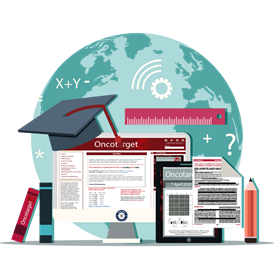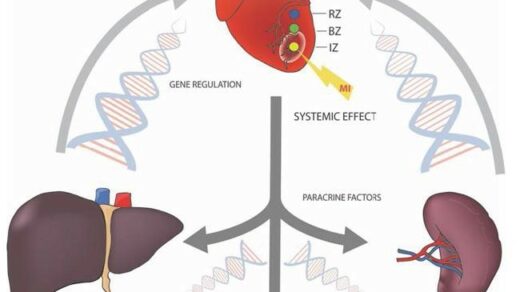Read short summaries of the latest oncology-focused research published in this week’s issue of Oncotarget, Volume 12, Issue 19.

Oncotarget’s Volume 12, Issue #19
New Publications
Cover (Research Paper): Nanoparticle T cell engagers for the treatment of acute myeloid leukemia
Origin: Missouri, United States
Institutions: Washington University School of Medicine, Washington University McKelvey School of Engineering
Quote: “We create nanoTCEs using liposomes conjugated to monoclonal antibodies to enable specific binding. We also recreate the bone marrow niche using our 3D culture system and use immunocompromised mice to enable use of human AML and T cells with nanoTCEs. We show that CD33 is ubiquitously present on AML cells.”
News: Old drug, new trick: proton pump inhibitors find new purpose in cancer care
Origin: Texas, United States
Institutions: University of Texas Health Science Center at San Antonio (UT Health San Antonio)
Quote: “We read with great interest the study by Hebert et al. recently published in Oncotarget, which investigates the radiosensitizing effect of the widely used over-thecounter proton pump inhibitor (PPI) esomeprazole.”
Research Paper: Novel insights into the molecular mechanisms underlying risk of colorectal cancer from smoking and red/processed meat carcinogens by modeling exposure in normal colon organoids
Origin: Virginia, Washington, United States; Barcelona, Madrid, Spain
Institutions: University of Virginia, L’Hospitalet de Llobregat, Consortium for Biomedical Research in Epidemiology and Public Health (CIBERESP), University of Barcelona, Fred Hutchinson Cancer Center Research Institute
Quote: “Tobacco smoke and red/processed meats are well-known risk factors for colorectal cancer (CRC). Most research has focused on studies of normal colon biopsies in epidemiologic studies or treatment of CRC cell lines in vitro. These studies are often constrained by challenges with accuracy of self-report data or, in the case of CRC cell lines, small sample sizes and lack of relationship to normal tissue at risk. In an attempt to address some of these limitations, we performed a 24-hour treatment of a representative carcinogens cocktail in 37 independent organoid lines derived from normal colon biopsies.”
Research Paper: Altered glucuronidation deregulates androgen dependent response profiles and signifies castration resistance in prostate cancer
Origin: North Carolina, Nebraska, Washington, United States
Institutions: North Carolina State University, University of Nebraska, University of Washington, The University of North Carolina at Chapel Hill
Quote: “Glucuronidation controls androgen levels in the prostate and the dysregulation of enzymes in this pathway is associated with castration resistant prostate cancer. UDP-glucose dehydrogenase (UGDH) produces UDP-glucuronate, the essential precursor for glucuronidation, and its expression is elevated in prostate cancer. We compared protein and metabolite levels relevant to the glucuronidation pathway in five prostate cancer patient-derived xenograft models paired with their isogenic counterparts that were selected in vivo for castration resistant (CR) recurrence.”
Research Paper: The antitumoral effects of chemerin are independent from leukocyte recruitment and mediated by inhibition of neoangiogenesis
Origin: Brussels, Belgium; Paris, France
Institutions: Université Libre de Bruxelles, Institut Pasteur
Quote: “Chemerin, a multifunctional protein acting through the receptor ChemR23/CMKLR1, is downregulated in various human tumors and was shown to display antitumoral properties in mouse models of cancer. In the present study, we report that bioactive chemerin expression by tumor cells delays the growth of B16 melanoma and Lewis lung carcinoma in vivo.”
Research Paper: Exploratory comparisons between different anti-mitotics in clinically-used drug combination in triple negative breast cancer
Origin: Brasília, Goiás, Brazil
Institutions: University of Brasília, State University of Goiás
Quote: “In this study we aimed to elucidate the role of KIF11 in TNBC [triple-negative breast cancer] progression throughout its inhibition by two synthetic small molecules containing the DHPM core (dihydropyrimidin-2(1H)-ones or -thiones), with the hypothesis that these inhibitors could be an interesting option of antimitotic drug used alone or as adjuvant therapy in association with AC.”
Research Paper: High expression of Myosin 1g in pediatric acute lymphoblastic leukemia
Origin: México City, Iztapalapa, México
Institutions: Hospital Infantil de México Federico Gómez, Universidad Autónoma Metropolitana, National Institute of Respiratory Diseases, Hospital Infantil Moctezuma
Quote: “Acute Lymphoblastic Leukemia (ALL) is the most frequent cancer in pediatric population. […] This study show[s] that Myo1g is over expressed in ALL and that may participate in the pathogenesis of the disease specially in high-risk patients.”
Case Report: Polyclonal on- and off-target resistance mutations in an EML4-ALK positive non-small cell lung cancer patient under ALK inhibition
Origin: Muenster, Essen, Goettingen, Germany
Institutions: University Hospital Muenster, West German Cancer Center, University Hospital Essen, University Medical Center Goettingen
Quote: “Treatment of advanced stage anaplastic lymphoma kinase (ALK) positive non-small cell lung cancer (NSCLC) with ALK tyrosine kinase inhibitors (TKIs) has been shown to be superior to standard platinum-based chemotherapy. However, secondary progress of disease frequently occurs under ALK inhibitor treatment. The clinical impact of re-biopsies for treatment decisions beyond secondary progress is, however, still under debate. Here, we report on two novel subsequent polyclonal on- and off-target resistance mutations in a patient with ALK-fused NSCLC under ALK inhibitor treatment.”
Research Perspective: Towards precision oncology in angiosarcomas using next generation “omic” technologies
Origin: Singapore
Institutions: National Cancer Centre Singapore, Duke-NUS Medical School
Quote: “Angiosarcomas are a group of aggressive tumors of vascular origin. Although thought to be a rare cancer constituting just 1–2% of all soft tissue sarcomas, recent observations suggest that angiosarcomas are more common amongst Asian populations as compared to the West, suggesting the possibility of distinct genetic or environmental triggers influencing its pathogenesis.”
Research Perspective: Targeting AP-1 transcription factors by CRISPR in the prostate
Origin: Aarhus, Denmark; Vienna, Austria
Institutions: Aarhus University, Aarhus University Hospital, Medical University of Vienna (MUV)
Quote: “Prostate cancer is the second most diagnosed cancer in men. It is a slow progressing cancer, but when the disease reaches an advanced stage, treatment options are limited. Sequencing analyses of cancer samples have identified genes that can potentially drive disease progression. We implemented the CRISPR/Cas9 technology to simultaneously manipulate multiple genes in the murine prostate and thus to functionally test putative cancer driver genes in vivo.”
Research Perspective: The role of dynamic phenotypes in cancer
Origin: Rio Grande do Sul, Brazil
Institution: Universidade Federal do Rio Grande do Sul
Quote: “The question of whether cancer recurrence is mediated by a process that is exclusively Darwinian or that involves both Darwinian and Lamarckian processes is long standing and far from answered. The major open question is the origin of variation, whether it relays exclusively on stable, mostly genetic, mechanisms or whether it can also involve dynamic processes.”
Click here to read Oncotarget’s Volume 12, Issue #19.
YOU MAY ALSO LIKE: More Oncotarget Videos on LabTube
—
Oncotarget is a unique platform designed to house scientific studies in a journal format that is available for anyone to read—without a paywall making access more difficult. This means information that has the potential to benefit our societies from the inside out can be shared with friends, neighbors, colleagues, and other researchers, far and wide.
For media inquiries, please contact media@impactjournals.com.



